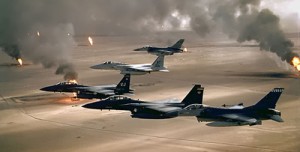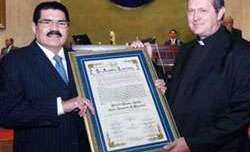The 43-day war in the Persian Gulf ended on Feb. 27 exactly as it began—amid controversy over its morality.
Catholics who backed Operation Desert Storm and those who opposed it both found their positions validated by the events of the war.
“The outcome of the war so well vindicated the arguments for its justice,” said Rev. Richard John Neuhaus, director of the Institute of Religion and Public Life in New York.
Neuhaus and others believe that the war proved that Americans have the moral resolve to fight and even to give up their lives for the democratic values of freedom and liberty from tyranny and unjust aggression.
 In defeating an evil dictator with ambitions for regional and even world domination, many Catholics feel that Americans conducted themselves honorably and nobly, taking great pains to discriminate between Iraqi military targets and innocent civilians.
In defeating an evil dictator with ambitions for regional and even world domination, many Catholics feel that Americans conducted themselves honorably and nobly, taking great pains to discriminate between Iraqi military targets and innocent civilians.
However, anti-war Catholics condemned the merciless bombing of Iraqi cities, which they said left countless innocent civilians dead and devastated the nation’s economy, environment and public health, while inflaming injustices in the region and throughout the Third World.
Far from conducting a moral or “surgical” war, many argue, the U.S. refused compromise, manipulated the United Nations, and allied itself with repressive regimes like Saudi Arabia, Turkey, Israel, and Syria, while whipping up American resentment against Arabs, Muslims, and Third World peoples.
“It was a war that never should have taken place,” said Gordon Zahn, director of the Center on Conscience and War in Charlestown, Mass. “When they add up the bodies—the tens of thousands of Iraqi soldiers killed, the thousands of so-called ‘collateral deaths’ of civilians, the life-long injuries caused that might even be as bad as death—we will discover that this was a very expensive exercise in impatience and intransigence.”
The two sides do agree that the period between Iraq’s Aug. 2 invasion of Kuwait and the U.S. declaration of victory on Feb. 27 was marked by an unprecedented measure of public discourse on the morality of war and a substantive consideration of the meaning of war and a substantive consideration of the meaning of world peace in the post-Cold War era.
“Historically, this is quite an astonishing moment,” Neuhaus said in an interview. “I don’t think one can find a time in American history in which there was five or six months of such intense deliberation and moral debate.”
Zahn was encouraged to see religious leaders and their congregations seriously seeking to “apply the just war tests to a potential war.” He was pleased, too, with the disagreements among U.S. bishops over the justice of the war. Their debate was a sign of the moral health and vigor of the Church leadership, he indicated.
The Church at War
Neuhaus offered a more subdued assessment of the religious community’s response to the rumors of war. With the exception of several Jewish and most evangelical Christian groups, he said, the nation’s religious bodies “debased rather than elevated the public discourse on the morality of the war.”
The fact that the nation’s religious leaders almost universally opposed the war, while an overwhelming majority of the American public supported it, confirmed to him the “leftward” drift of the religious hierarchy and its “alienation” from the views of the people in the pews.
Neuhaus was heartened, he said, by the moral calculus of prominent lay Christians, especially President George Bush, “who took the lead in framing the issue in explicitly moral terms.” He also praised the members of Congress, whose deliberations on whether to authorize the war were an “impressive exercise in public moral discourse.”
While superior to the “hysterical” analyses presented by the mainline Protestant National Council of Churches, anti-war arguments made by the National Conference of Catholic Bishops and that of many individual bishops were morally flawed, according to Neuhaus.
Especially in trying to assess the “proportionality” of the war (whether the good to be gained would outweigh the harm and injustice it might cause), the bishops confused their “prudential judgments about contingent facts” with “moral principles,” he said.
Because they aren’t competent to judge military and geopolitical strategy, the bishops’ pre-war estimates of the destruction, civilian deaths and regional instability that a war might cause were, at best, “judgment calls,” Neuhaus explained.
The actual results of the war proved the “astonishing ignorance” of the bishops’ pre-war fears about the consequences of war on Iraq’s civilian population, he added.
Collateral Damage
According to George Weigel, director of the Ethics and Public Policy Center in Washington, the accuracy of U.S. weapons and the relatively few Iraqis killed by allied bombing raids should have a profound bearing on the moral analysis of future conflicts.
In recent years, Christian moralists, including Pope John Paul II, increasingly have assumed that modern weapons could never be used in a way that discriminates between civilian and military targets.
Such assumptions were proven “empirically false” by the use of “highly discriminate” weapons in the Gulf War, Mr. Weigel said. It may be that, as a result of the war, Christian theorists will conclude that modern weapons in fact make it possible to wage “proportionate” and “discriminate” wars.
But opponents of the war argue that the civilian death toll will eventually be revealed to be far higher than Weigel, Neuhaus and U.S. military officials assume. Though convinced that President Bush and his generals sincerely tried to avoid killing innocents, Zahn insisted that massive civilian casualties were unavoidable because “the weapons in themselves are indiscriminate.”
Zahn charged that, regardless of their accuracy in hitting targets, when bombs explode, the damage they cause extends well beyond the target area. He also questioned the actual accuracy of the weapons used in the Gulf, citing the Secretary of the Navy’s observation that 40 percent of the laser-guided weapons missed their targets.
“If that’s how ‘smart’ bombs perform, it’s frightening to think of how well the ‘dumb’ ones did in hitting their targets,” Zahn said.
Aquinas and Augustine Ignored
Rev. Richard McSorely, S.J., director of Georgetown University’s Center for Peace Studies, criticized what he described as the abuse of Catholic “just war” theory by the Bush Administration and its supporters.
Though he referred to the tradition of St. Thomas Aquinas and St. Augustine to defend his policies, the President ignored decisive elements of their teaching and misconstrued others, Father McSorely charged.
“Thomas said that no innocent can be killed, even indirectly, in a war,” a stipulation clearly violated in the clash with Iraq, Father McSorely said. Further, in Augustine’s teaching, war must be undertaken for the “common good of the human family: and war-makers must love their enemy and never revel in the killing that war makes necessary.
“Augustine says that the soldier must have a ‘mournful mood’ in battle,” Father McSorely said. “You are never to rejoice about it. You must look on the killing as something necessary and ask the Lord to forgive you for what you must do. Now that’s far from the attitude that you see of the generals in TV talking about how wonderful the bombs worked.”
Opponents argue that Bush’s claim for the justice of the war rests solely on his assertion that the U.S. had a “just cause” in fighting for the liberation of Kuwait from the brutal and unjust Iraqi occupation.
Father McSorely questioned whether Kuwait’s liberation was the real intention behind U.S. action, recalling earlier references by President Bush to “our way of life” and Secretary of State James Baker’s assertion that the conflict was about preserving American “jobs.”
If the actual motivation for the war was “American interests, oil, or maintaining the balance of power, then the war is immoral at its very beginning,” he said.
‘Preempting’ War in A Post-Cold War Era
Backing President Bush, Weigel argued that, in the post-Cold War era, thinking about the just cause of regional, non-nuclear conflicts must be return to the original medieval understanding that a war is “just” if its seeks “to prevent grave evil or to punish wickedness.”
In this new era, the just war theory should be open to the possibility that the nation has a “moral responsibility” to engage in “preemptive” wars aimed at thwarting the evil aspirations of regional tyrants, he added.
In any event, Father McSorely said, Aquinas’ just war teaching distinguishes between the morality of a war and the justice of its cause.
“Having a just cause does not make the war moral,” he said. In addition to violating the just war criteria of proportionality, the U.S. clearly violated the proviso that war be a “last resort,” he said.
Both before and during the war, the U.S. manipulated the workings of the United Nations’ Security Council, critics contend. The country also refused to negotiate and even rejected peace proposals brokered by its allies and agreed to by Iraq.
Defending the war as a last resort, Weigel argued that five months of economic sanctions enabled Iraq to fortify its hold over Kuwait and cost many Kuwaitis their lives.
He also questioned whether sanctions were as “morally clean” as anti-war advocates had maintained. Sanctions hurt the most “those whom the just war tradition requires us to treat as noncombatants, that is, the ordinary people of Iraq,” he said.
As they are at odds over the moral conduct of the war and whether it should ever have been fought, Catholics differ in interpreting the war’s indisputable demonstration that America is the world’s greatest military power.
Neuhaus hopes that the war will have a “defining impact” on Americans’ “critical understanding” of their nation and the “moral character” of the nation’s role in the world.
Father McSorely, on the other hand, deplored the post-war talk of “erasing the Vietnam disgrace.” He decried the “American triumphalism” of the war’s supporters and their belief in America’s moral superiority.
Against President Bush’s claim that the nation and its allies were “on the side of God,” he warned: “Victory is no measure of the morality of the war and military power does not make a country righteous.”
For Father McSorely, the use and abuse of the just war theory by both opponents and proponents of the war demonstrates its inadequacy for helping Christians to assess the demands of their faith in the post-Cold War era.
“The just war theory is philosophy,” he said. “It’s not the Gospel and it’s never had any scriptural basis. It is whatever anybody says it is.”
The proper starting point for future Christian reflections on war and peace must be the Gospel—especially Jesus’ teachings of love and forgiveness and the use of such spiritual weapons as prayer, fasting, and penance to cast out evil in the world.
Since the early Church, the Christian tradition has taught that war is caused by sin, Father McSorely said. The war in the Gulf is a result of Iraq’s as well as America’s “lust for power, possession, and influence.”
In light of that, the American Christian attitude to the country’s victory should be that of sorrow and penance, he said. Americans should implore God’s forgiveness for the sins that brought the nation to war and the sins against God’s commandment of love committed during the war.
“Penance is due now and reconciliation with the people of Iraq and Kuwait,” he said. “We have to have repentance if we expect forgiveness.”
Religious Sentiments Distorted
From the millennial expectations of those who saw the war as fulfilling ancient prophecies, to the political abuses of religion by U.S. and Iraqi leaders, the war was a a forceful rejoinder to those who believe the modern world is becoming progressively more “secularized.”
Religious sentiments were so distorted by both sides in the conflict that Pope John Paul II opened the recent Vatican summit on the Middle East with a condemnation of all who would seek to make God an accessory of their war policies.
“There is no religious war taking place and there could never be a ‘holy war,’” he said.
Some U.S. Church leaders, however, felt the lines between faith and patriotism were blurred during the war.
When the nation’s religious broadcasters applauded President Bush for his claim that God would guide the U.S. to victory, Archbishop Francis Hurley of Anchorage, Alaska, responded: “I wonder if any of them at that moment thought of Jesus Christ as he stood humiliated before Pilate in apparent defeat?”
Others worried how quickly American believers set aside the demands of the Gospel to embrace the war effort.
Bishop Charles Chaput, OFM, Cap., of Rapid City, South Dakota, observed that too many people seemed to reject the Church’s teaching on war and peace as “just high idealism and theory which need not be taken seriously in the real world of every day.”
Beneath the yellow ribbons and the “God Bless Our Troops” buttons there seemed to be a kind of popular despair—a conviction that war was inevitable and that ordinary citizens were powerless to oppose the ambitions of government leaders.
“We have come to accept war itself as thought it were completely beyond our control, and that is the real sadness… We have come to accept war as people without faith,” said Cardinal John O’Connor of New York.
The willingness of the war’s supporters to curtail democratic liberties and Christian freedom of conscience also alarmed Church leaders.
The intolerance of dissent from U.S. war policy was so severe that it prompted Cardinal O’Connor, formerly the nation’s chief naval chaplain, to remind Catholics: “It is the highest form of loyalty to ask if what we are doing is right.”
The ugliest development domestically was the rise of crimes against Arabs, Muslims, and Jews, apparently motivated by religious or racial bias. Businesses and places of worship were defaced and burned. Jews and Arabs were beaten and threatened. Certain businesses refused to serve Arabs, and the U.S. government undertook what some charged was a racially-motivated investigation of the political beliefs of Arab Americans.
Despite the staunch warnings of Archbishop Joseph Ryan of the Military Archdiocese, there was a “hardening of hearts” among supporters of the war and a “lessening of Christian moral standards” during the war.
Archbishop J. Francis Stafford of Denver condemned Richard Cheney, U.S. Secretary of Defense, and Gen. Colin Powell, Joint Chiefs of Staff chairman, for their callous “autographing” of bombs with inscriptions such as, “This one’s for you, Saddam!”
On Ash Wednesday, two days after their autograph session in Saudi Arabia, those same bombs were used in an assault on Baghdad that left 400 Iraqi civilians dead, the archbishop noted. “War can brutalize those who watch as well as those who engage in the fighting,” Archbishop Ryan had warned.
And it is clear that the war unleashed in many Americans a torrent of brutal and violent emotions. A war-time poll revealed that 45 percent of Americans were in favor of using nuclear weapons against Iraq, despite Archbishop Ryan’s warnings against adopting a “ruthless pragmatism that lets the end justify the means.”
Questions for The ‘Peace’ Movement
Just as supporters of the war often lost sight of their Christian obligations so, too, the war seemed to expose moral shortcomings in Christian anti-war arguments.
Self-described “peace” workers often appeared contemptuous and judgmental of the motives and conscience decisions made by soldiers and American leaders. Their protests, many noted, lacked spefic constructive solutions for dealing with the real threat posed by Iraqi aggression or for reversing the invasion of Kuwait.
Too often, they seemed to imply that the torture and plunder of Kuwaitis would have to be accepted because of past and continued U.S. “imperialism” in the region and because the U.S. had supported the buildup of Saddam Hussein’s war machine.
Bishop Joseph O’Keefe of Syracuse raised important questions that were left unanswered by many anti-war protests: “Do we have concerns and duties beyond our shores? We are not the police force of the world, but does the world have legitimate demands on this nation so highly blessed?”
Further, it seems that, at times, peace activists didn’t take seriously what Pope Pius XII and the U.S. bishops have called the “inalienable obligation” of Christians to defend weak peoples against unjust aggression.
Future reflection by Catholic peacemakers will need to begin with the point made by Archbishop Ryan: “To tolerate injustice … may spare us from open conflict for a while, but it certainly does not create a world at peace.”
First published in The Evangelist (March 7, 1991)
© David Scott, 2009. All rights reserved.


